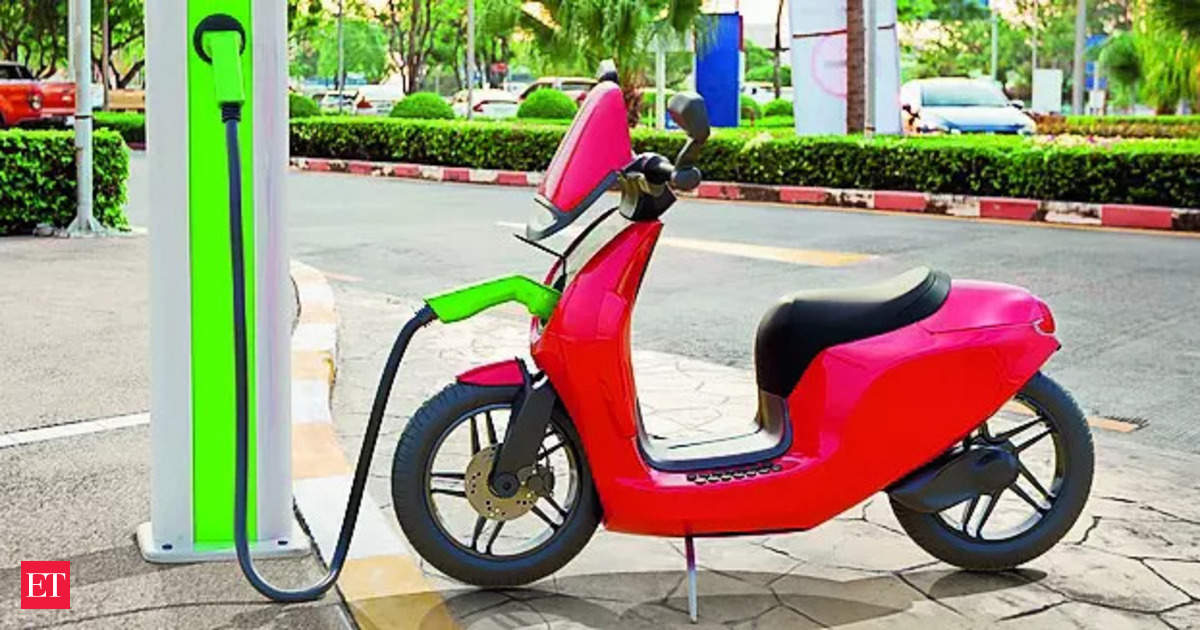After starting from the back, older companies accounted for roughly one in three units sold in the category in the first three months of the current year.
Overall, sales of electric two-wheelers rose 1.4% to 221,548 units, according to the Federation of Automobile Dealers Associations (FADA).
He market share The share of traditional companies in the electric two-wheeler segment rose to around 30% in April-June, from about 25.5% in the same period of FY24, according to FADA data.
The six companies mentioned above account for almost 90% of electric two-wheelers sold in the local market, with smaller companies such as Wardwizard, Okaya and BGauss making up the rest.
While Ola Electric continued to maintain a strong lead, selling 107,911 units last quarter, an increase of 57% over the previous year, Bajaj Auto and MotoCorp Hero Volumes increased by 50% to 25,733 units and 376% to 6,472 units, respectively.
Increasing carbon footprint of electric vehicles
Shipments of Hero MotoCorp’s Vida V1 electric scooter rose 186% to 10,000 units in the June quarter, the company said. Hero’s market share in terms of wholesale shipments was 5%.
TVS Motor, Ather and Greaves saw their sales fall during the period. Carmakers in India mostly report wholesale shipments from factories to dealers. FADA collects registration data (a proxy for retail sales) from the Ministry of Road Transport and Highways’ VAHAN portal.
“We have seen that our Vida EV brand is starting to increase its presence and market share,” Hero MotoCorp CEO Niranjan Gupta said at an investor conference. “We will expand the portfolio in affordable segments during this fiscal, and focus on EV leadership, expanding the category and increasing scale and volume.”
Bajaj Auto is also confident of consolidating its presence in the electric vehicle segment.
Being a cash-rich company, Bajaj Auto Managing Director Rajiv Bajaj is not overly concerned about profitability and is in the long-term segment, he said at the company’s last annual general meeting (AGM).
“There’s a part of me that wishes this segment wouldn’t be profitable for a long time,” he said. “Because we may be the last scooter standing at the end of the day. Let it stay that way. Let the circus continue. One by one, all the monkeys will leave the circus, and in the end, let’s hope we’re still there.”
The company will put greater emphasis on growth than profitability, given the new products and brands it has, he said. Bajaj Auto is considering increasing sales of Chetak electric scooters to 15,000 units per month in the near term and then to 20,000 units per month by expanding its network.
Gupta said Hero has also been working on building a strong foundation for its new Vida brand (for eco-friendly vehicles) through branding initiatives, expanding its network and setting up a charging network, which has started to reflect in sales.
The company is present in 200 cities with more than 300 contact points and has installed more than 2,500 charging stations in collaboration with Ather Energy, in which it holds a 40% stake.
At the investor conference, Hero MotoCorp said it is working across different formats, with Vida to be sold through Hero 2.0 and Premia stores, as well as Vida Hubs, which are specialist dealerships, and two experience centres.
It has also set up an extensive service network to ensure ease of ownership. The company said its efforts are now paying off as it achieved its highest monthly shipments in every month of this fiscal year so far (April-July).
Besides launching more affordable products in the mid-range and entry-level segments to shore up volumes in the domestic market, Hero MotoCorp is also planning to launch its electric vehicles in select European markets and the UK this year. “As volumes pick up, fixed costs will be absorbed in operating leverage and with PLI fulfillment, we will move towards profitability,” Gupta said.
Bajaj said profitability in the electric two-wheeler sector is difficult as it depends on many factors, including the market and competition. “We have a competitor who believes in reducing prices by Rs 10,000 every month,” he said, referring to Ola Electric. “We will put more emphasis on growth, maybe more than before. We are not married to 20% EBITDA. We don’t have a target for EBITDA. It is more a result of what we do – of our sales, our price, of the money we invest, etc.”
It is important for Bajaj Auto to grow as fast as it can on the back of some of these new brands and new products, he added.
TVS, India’s third-largest two-wheeler manufacturer, is planning to launch several products, including several electric vehicles at different price points. “Electric vehicles are, of course, a big opportunity for us,” Sudarshan Venu, CEO, TVS Motor, told ET in a recent interaction.
Disclaimer:
The information contained in this post is for general information purposes only. We make no representations or warranties of any kind, express or implied, about the completeness, accuracy, reliability, suitability or availability with respect to the website or the information, products, services, or related graphics contained on the post for any purpose.
We respect the intellectual property rights of content creators. If you are the owner of any material featured on our website and have concerns about its use, please contact us. We are committed to addressing any copyright issues promptly and will remove any material within 2 days of receiving a request from the rightful owner.

